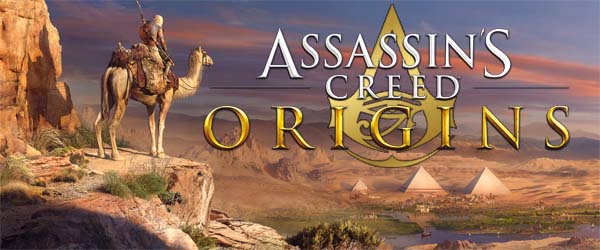
Hey, I actually managed to play and review all of this past holiday season's big, Triple-A releases! Hooray for me! I mean, sure it's the end of February, and I'm just now reviewing a game that came out last October, but at least I did play it.
Since the refreshing exceptionalism of Black Flag, the Assassin's Creed franchise has been scarred by mediocrity and controversy. As such, I opted to buy the game used off of eBay so as not to support Ubisoft. This is after I had enjoyed Black Flag so much that I happily bought a retail gift copy for a friend and recommended the game to yet another friend. Heck, if the save file could have been transferred over, I would have gladly traded in my PS3 copy of Black Flag for a PS4 retail copy.
Even Ubisoft realized that the series was growing stale, and stopped their cycle of releasing two or three games per year. It's been two full years since the last full release (Assassin's Creed: Syndicate in 2015). The extra time certainly helped elevate Assassin's Creed: Origins above the chaff of the rest of the franchise, but not quite enough to propel it to true greatness.
I played Origins on PS4, which means that I avoided the frustrations that many gamers reported involving Origins' multiple layers of DRM slowing down their computers. Wait, isn't Ubisoft the company that, years ago, publicly stated that DRM doesn't work, and that they "don't want to punish a paying player for what a pirate can easily work around"? This same company is now putting not one ... not two ... but three separate DRM applications on a single game? One of which is their own proprietary distribution service, U-Play? Is the company lying, or are they just scatterbrained and can't make up their mind? Or is the management just incompetent?
Would exploring tombs and temples by torchlight become a common mechanic?
Well, when I started up the actual game, I was pleasantly surprised that it starts off pretty damn strong. Even Black Flag was mired by an opening act that stranded players in a tedious, bog-standard Assassin's Creed
sandbox city for a couple hours before opening up the seas by giving us our own pirate ships. Origins, however, has a very strong, distinctive opening chapter that eventually gives way to a more bog-standard gameplay experience.
After an admittedly-silly and confusing opening cutscene that utterly fails to establish the setting or characters, Origins throws the player into a one-on-one duel to highlight the new combat mechanics, then hands main character Bayek a torch and asks the player to explore and escape from a derelict Egyptian temple. Then we head off across an intimidating swath of Saharan desert to the oasis that is Bayek's home town. Here, we have some open-ended exploration, hunting, rescue, and assassination missions. During this, we are introduced to the game's shining star: its setting and environment.
Classical Egypt is magnificently brought to life in this game. The map is vast and spread out, with large swaths of barren desert and sand dunes separating some of the game's regions. Small farming settlements and market hubs dot the environment, and each feels like a necessary part of a functional society. Best of all, Bayek isn't stopping every ten steps to pick up some random, meaningless collectible, and our map isn't cluttered with icons representing all this meaningless garbage.
Egypt feels vast, is beautiful, and is brimming with life and energy.
Not only does the map work well with its sense of physical scale, but it also excels at representing the temporal scale of Egypt. Even though we are playing in antiquity, the game world is still dotted with tombs and abandoned settlements, some of which are thousands of years old. Remember, ancient Egypt is one of the longest-lasting civilizations in the history of the world, having been a world superpower for over three thousand years! The time span between the building of the Great Pyramids in Giza, and the life of Cleopatra is longer than the time span between Cleopatra and our lives today. Assassin's Creed: Origins completely nails that sense of living in this ancient kingdom... [More]
127c637d-fe49-4052-bc0a-c76d2f790de8|0|.0
Tags:Assassin's Creed, Assassin's Creed: Origins, Ubisoft, history, RPG, action, combat, stealth, parkour, Egypt, Rome, Bayek, Cleopatra, McGuffin, Dark Souls, micro-transaction, eBay
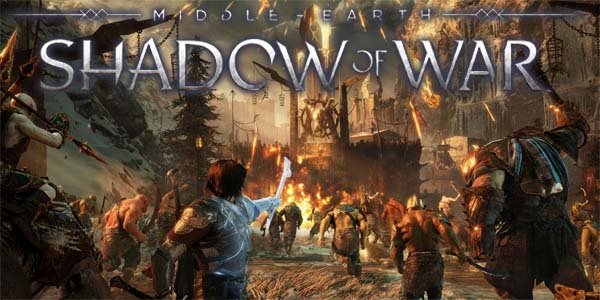
Dang. I was really hoping to have this out before the end of the year...
Shadow of Mordor was easily one of my favorite games of 2015, and one of my best reviewed games of that year, and I even cited it as an example of successful open world game mechanics. I've praised the game for its tightly-focused design, relatively limited scale, and the fact that it didn't waste the player's time with an excess of meaningless collectible hunts.
"The developers showed plenty of restraint in many areas of design so that they could focus on the innovative new feature that everything in the game revolves around. The design is tight and streamlined. They didn't waste the player's time with an excessively large, complicated map, or a multitude of irrelevant mini-games and side quests."
- from my Middle-Earth: Shadow of Mordor review
Yes, the original game did have some collectible hunts. It did have some filler content. It did have bullshit, game-y missions with arbitrary win/loss conditions. But those issues weren't pervasive enough to bring down the game as a whole, and the game generally flowed very smoothly. In their quest to mindlessly monetize the sequel, Shadow of War, Warner Brothers and Monolith have doubled down on both the best elements and the worst elements of Shadow of Mordor, and the result is beautiful when it works, and ugly when it doesn't.
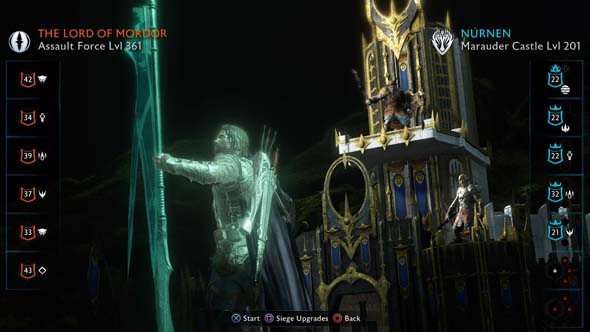
You now recruit orc captains to defend fortresses from Sauron's army.
The biggest problem is that the game now feels like a grind. In order to get you to pay for in-game, randomized micro-transactions called "War Chests", the campaign has been needlessly padded-out. Instead of having the option to hunt down uruk captains for the utilitarian purposes of gaining intel or gathering an army of mind-controlled slaves to do your bidding, you now must recruit orc captains into your own army in order to siege and then defend castles and fortresses from Sauron's counter-invasion. In principle, this sounds like a brilliant idea! I've often criticized open world and sandbox games for not having actual threats or consequences that pressure the player into acting. In fact, requiring that the player defend and hold captured strongholds from enemy counter-attacks is exactly the sort of thing that I've proposed as a compelling way to keep the game world feeling alive, and to keep the villain actually feeling threatening and antagonistic.
The problem is that (aside from one scripted castle defense) all the castle defending is back-loaded into the final act of the game. At this point, the plot is basically over, ... [More]
ae89c159-d700-491f-810c-2ed2093b5137|0|.0
Tags:Middle Earth: Shadow of War, Middle Earth: Shadow of Mordor, the Lord of the Rings, Monolith Productions, Warner Brothers Interactive Entertainment, J.R.R. Tolkien, Talion, Celebrimbor, orc, undead, wraith, elf, Middle Earth, Sauron, Shelob, Brûz The Chopper, action, open world, sandbox, parkour, RPG, micro-transaction, war chest, loot box, eBay
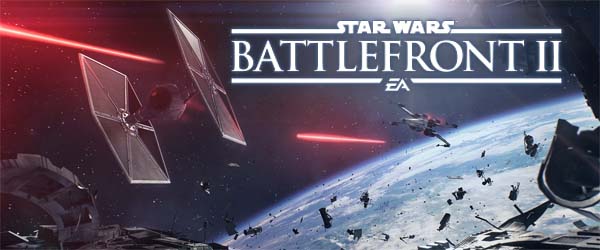
Dang, I was really hoping to get this one out before the end of the year...
Thanks to previews, journalists, and complaints from beta users, this is yet another game that I knew better than to buy on launch day at full retail price. Even before the game came out, beta players and gaming websites were already condemning Battlefront II for its pay-to-win multiplayer system. When the media finally got their hands on preview builds of the full game, they were quick to attack the online progression system. Once the game was released, public outcry forced EA to literally neuter the game's online economy.
Slot machines are legally required to disclose
their paytables -- and sometimes their RTP.
EA started damage control by slashing the prices of heroes so that they supposedly weren't as much of a grind to unlock. However, the sneaky bastards also reduced the rewards for various in-game activities (such as completing the campaign), so as to render the cost reduction virtually moot. Then, EA disabled micro-transactions altogether. So by the time I finally started playing the game (over a month after launch), it was a totally different experience than it was intended to be at launch.
Star Wars license-holder Disney was furious with EA for potentially tarnishing the Star Wars brand (especially with the pending release of The Last Jedi). EA's stock prices fell as a result.
Battlefront II has actually caused law-makers and regulatory agencies in the United States and Europe to consider whether loot boxes qualify as "gambling", and whether they should, therefore, be regulated as such, including banning their sale to minors. Corporations are also starting to hop onto the bandwagon of self-regulation. Apple announced that all iOS apps with randomized micro-transactions must disclose the odds associated with rewards. This is the same disclosure that is actually legally required for actual gambling, such as slot machines.
For the record, I do not object to gambling per se. I actually bet every week on college and NFL football. Don't worry, I live in Nevada; it's legal for me. I spent almost three years working as a game developer for a slot machine manufacturer, and the only reason that I'm not still at that job is because the entire department in which I worked got laid off in the wake of a corporate merger (I'm actually very bitter and opposed to corporate mergers, by the way, but that's a discussion for another time). So I don't have a problem with gambling. I just think that it has a time and a place, and I don't want that time or place to be in my video games that I'm already paying $60 just to play. This is why casinos don't generally charge a cover fee.
I personally feel that Shadow of War and Destiny 2 are much more egregious examples of corporate avarice.
Also, for the record, I think that Battlefront II's micro-transaction controversy is a bit overblown. It's an online multiplayer shooter in which there is no win condition or end state. Whether you want the extra hero characters, and whether you're willing to spend time or money to get them is entirely up to the player's own whim. The game is perfectly playable without those heroes, and you can play through the campaign completely without spending an extra penny. It's a bit sleazy that EA markets the game by advertising these characters, and then locks them behind a grind/pay wall, but fighting games have been hiding unlockable characters behind grind-walls for decades.
Battlefront II isn't even the worst micro-transaction / pay-to-win system to come from EA! EA Sports titles like Madden and FIFA have been getting away with much worse pay-to-win systems (via their respective Ultimate Team modes) for years. Personally, I also think that Shadow of War (review coming very soon) has a much more offensive micro-transaction model because Warner Bros actually tied it into that game's campaign. If you want to finish the story, you either have to sit through the grind, or pay to speed it up. Though all of these pale in comparison to Activision and Bungie locking formerly-accessible end-game content behind the pay-wall of a Destiny 2 expansion pack.
In any case, it's sad that a review of a video game has to turn into a political op-ed, but that's the sad state of things right now.
Controversy and public outrage forced EA to completely disable in-game purchases.
So, if I knew that the game was controversially terrible, why did I bother to play it? ... [More]
ca397aec-963c-441f-946e-73a4ac8e54dd|1|4.0
Tags:Star Wars, Star Wars: Battlefront, Star Wars: Battlefront II, loot box, micro-transaction, multiplayer, shooter, single player, campaign, Galactic Empire, Imperial Raider, Star Wars: X-Wing, Disney, EA, Electronic Arts, DICE, Motive Studios, Criterion Games, gambling, regulation, casino, eBay
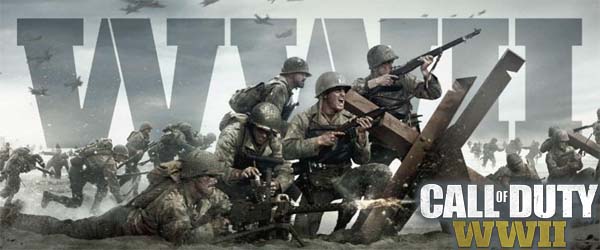
I haven't played a Call of Duty game since World At War on the PS3 almost 10 years ago. I really liked the first two CoD games on PC, but after Infinity Ward stopped developing the games, they increasingly focused on spectacle rather than any attempt to accurately portray war. After throwing back more enemy grenades in the first mission of World At War than were probably ever manufactured in all of World War II (I'm exaggerating a little bit), I got sick of that game and basically gave up on the franchise.
After having a little bit of fun with EA's Battlefield 1, I decided to pick up a used copy of Call of Duty World War II from eBay. I was curious if the return to World War II would be taken a little bit more seriously by Activision. It wasn't. This is the same old stale Call of Duty that I've been actively avoiding for the past decade. The single-player campaign didn't do anything to pull me in.
A light-gun shooting gallery
Probably the biggest problem with the campaign is just how rote and repetitive it feels. Almost all of the game's missions boil down to moving from one shooting gallery to another. When you aren't in an outright combat tunnel (like a bunker or trench), you're only given about a hundred feet of lateral space to work with. The whole game feels very confined and small in scale, with very few opportunities for any tactical movement such as flanking maneuvers. Just sit behind cover and pop out to take a few shots, then repeat. It might as well be an on-rails shooter, or one of those pop-out-and-shoot light-gun arcade machines like Time Crisis. I wonder if this was maybe done to make the game work better in VR? Maybe they wanted to reduce the amount of movement so that players don't get motion sick? But it's not VR, so it just comes off as lazy and tedious.
Almost all the missions boil down to moving from one narrow shooting gallery to another.
Even when the game tries to do something a little different, it usually still finds a way to make it uninteresting, or to outright get it wrong. There are some stealth mechanics shoe-horned into the game -- because of course there's stealth mechanics. They are rudimentary and very unforgiving. It's clear that certain segments are intended to be played stealthily, but you just don't have the tools necessary to make it work, and the levels aren't designed very well for stealth. Your limited field of view makes environmental and situational awareness very difficult. It's hard to tell where enemies are, and it's also hard to tell if your'e hidden behind cover. Even if you are effectively hidden, you can't peek out of cover to monitor the enemy's position or movements.
After stealth killing one or two enemies, I almost always got caught and was forced into more shoot-outs. Many of these scenarios involve the player being isolated and usually disarmed, so that you don't have the firepower to easily deal with a shootout when it inevitably happens. Put simply, the stealth is only barely functional and might as well not even have been included.
The undercover "Liberation" mission is the only level that is actually built around stealth.
The only stealth level that worked was the undercover "Liberation" mission with the Marquis (which you mostly play as a different character). ... [More]
66c29444-437c-4e77-8f5a-591d0762a918|0|.0
Tags:Call of Duty, Call of Duty: WWII, Activision, Sledgehammer Games, Raven Software, World War II, Germany, Nazi, history, war, Holocaust, Jew, concentration camp, online, multiplayer, Skinner Box, loot box, micro-transaction, gambling, shooter, bot, campaign, ESRB, eBay
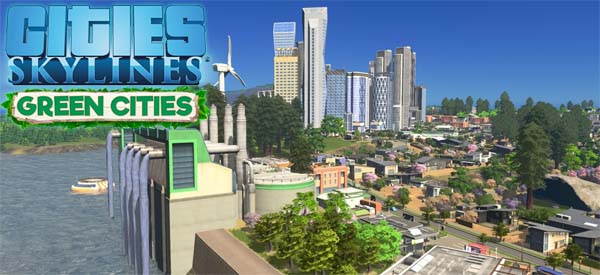
Didn't we just have another Cities Skylines expansion this spring or summer? Yep, we sure did. Mass Transit released only five months earlier (May 18th)! Heck, there was also another, tiny DLC pack released later in the summer as well. I didn't pick up the Concerts DLC. At $7 (more than half the price of a full DLC), I just didn't feel like it was a very good value if all it does is add the ability to make an outdoor concert venue. If the Concerts DLC had been a full-fledged expansion that focused on planning and managing city events, that might actually have been pretty cool. I actually would have been totally on board with a full expansion focused around building arenas, stadiums, convention centers, festival spaces, and so forth; then managing the traffic going into and out of them; and inviting concerts, sporting events, music festivals, trade shows, and maybe even political rallies or the Olympic games to your city. Unfortunately, the scope of Concerts is about the same as the Match Day DLC, which Colossal Order were kind enough to give away for free. Maybe I'll pick up Concerts if it goes on sale for $3 or $4.
Mass Transit, on the other hand, was a full expansion, and might very well have been the best expansion for Skylines to date. While the previous expansions were focused on adding additional flavor and customization to your city, Mass Transit actually took a stab at providing more utilitarian solutions to one of the most endemic problems that your burgeoning cities will inevitably face: traffic congestion. It was pretty successful at that mission.
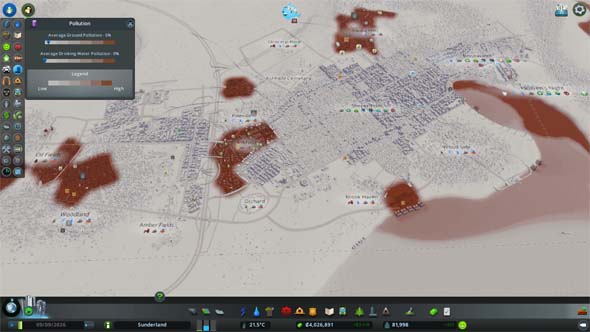
Green Cities aims to solve any pollution problems your larger cities may be suffering from.
Green Cities tries to follow suit. Except instead of helping to solve your traffic woes, it offers new tools for addressing the second most significant and intractable problem your cities will ever have: pollution.
I never really had a problem with pollution to begin with
I'll admit that I never really had much of a problem with pollution in my Cities: Skylines cities to begin with. Thus, I haven't really found Green Cities to be as useful as it seems to think it should be. I usually only had a few blocks of default industry in my cities. I usually focus on lumber and farming once they become unlocked, and then go strictly with offices once those are unlocked. And even then, I rarely play a single city long enough to get it up into the millions of population. Maybe at that point, pollution is a critical issue, but for me air pollution has rarely been a problem.
Smaller cities can see some benefit from the inclusion of things like the recycling center, which is available as early as the first milestone. It can apparently replace landfills in very small cities and seems to have less of a ground pollution footprint. I'm a bit annoyed that it doesn't seem to have any visual indicator of how full the building is. It would have been nice to have animations of the building filling up with junk and processing it, but whatever. The "Recycling" policy is still its own thing (and is unlocked a couple milestones later), and I'll admit I'm not sure how (or if) the recycling center building and the recycling policy interact with one another. I guess the recycling center actually acts as garbage storage and converts some trash into consumable goods, whereas the policy only reduces the amount of garbage that the city generates. There's also an "Plastic Recycling" policy that simply improves the efficiency of the recycling center.
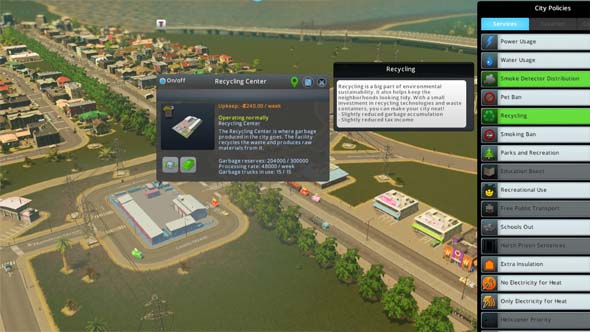
Recycling centers are available very early as a substitute for landfills.
Water pollution, on the other hand, is always a pretty big deal. Maps that have flowing water such as rivers are usually not a problem, but anytime I have to dump sewage into a lake (or even the ocean), it quickly becomes a cesspool. Up until now, there was virtually nothing that you could do about that... [More]
0bf42c7a-b9e9-41e4-8879-0f6259a2bb69|0|.0
Tags:Cities: Skylines, Cities: Skylines: Green Cities, Colossal Order Ltd., expansion, city simulation, pollution, health, energy, garbage, sewage, organic market, tech sector, solar power, garden
|

| 12 | | | | | | | 60 | | 11 | | | | | | | 55 | | 10 | | | | | | | 50 | | 09 | | | | | | | 45 | | 08 | | | | | | | 40 | | 07 | | | | | | | 35 | | 06 | | | | | | | 30 | | 05 | | | | | | | 25 | | 04 | | | | | | | 20 | | 03 | | | | | | | 15 | | 02 | | | | | | | 10 | | 01 | | | | | | | 05 |
|